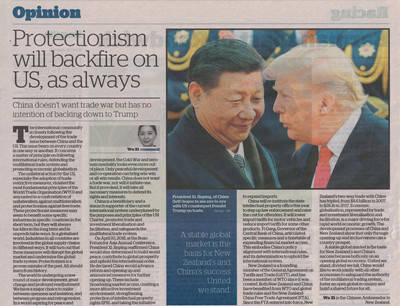On 16 April 2018, the New Zealand Herald and its website published a signed article by Ambassador Wu Xi entitled Protectionism Will Backfire on US, As Always. The full text is as follows:

The international community is closely following the development of the trade issue between China and the US. This issue bears on every country in one way or another. It concerns a matter of principle on following international rules, defending the multilateral trade system and promoting economic globalisation.
The unilateral action by the US, especially the adoption of trade restrictive measures, violated the most fundamental principles of the World Trade Organisation (WTO) and amounted to a confrontation of unilateralism against multilateralism and protectionism against free trade. These protectionist measures may seem to benefit some specific industries in specific countries in the short term, but they will always backfire in the long term and in unpredictable ways. In a globalised world, industries in all countries are involved in the global supply chains in different ways. It will turn out that these measures will disrupt the global market and undermine the global trade system. Protectionism is a proven mistake of the past. All should learn from history.
The world is undergoing a new round of major development, great change and profound readjustment. We have a major choice to make between openness and isolation, and between progress and retrogression. In a world aspiring for peace and development, the Cold War and zero-sum mentality looks even more out of place. Only peaceful development and co-operation can bring win-win or all-win results. China does not want a trade war, nor will it initiate one. But if provoked, it will take all necessary measures to defend its rights and interests.
China is a beneficiary and a staunch supporter of the current international system underpinned by the purposes and principles of the UN Charter, promotes trade and investment liberalisation and facilitation, and safeguards the multilateral trade system.
On April 10, 2018, at the Boao Forum for Asia Annual Conference, President Xi Jinping reaffirmed China would stay determined to build world peace, contribute to global prosperity and uphold the international order. He declared China would advance reform and opening up and announced measures for further opening up. These include broadening market access, creating a more attractive investment environment, strengthening protection of intellectual property rights (IPR), and taking the initiative to expand imports.
China will re-institute the state intellectual property office this year to step up law enforcement and raise the cost for offenders. It will lower import tariffs for motor vehicles and reduce import tariffs for some other products. Yi Gang, Governor of the Central Bank of China, articulated specific measures and a timetable of expanding financial market access. This embodies China's policy alignment with international rules, and its determination to uphold the international system.
New Zealand is a founding member of the General Agreement on Tariffs and Trade (GATT), and has been a member of WTO since it was created. Both New Zealand and China have benefited from WTO and global trade rules and the New Zealand-China Free Trade Agreement (FTA). Since the FTA entered into force, New Zealand's two-way trade with China has tripled, from $8.6 billion in 2007 to $26.1b in 2017. Economic globalisation, represented by trade and investment liberalisation and facilitation, is a major driving force for rapid world economic growth. The development processes of China and New Zealand show that only through opening-up and inclusiveness can a country prosper.
A stable global market is the basis for New Zealand's and China's success because both rely on an opening global economy. United we stand, divided we fall. China would like to work jointly with all other economies to safeguard the authority of the multilateral trading system, foster an open global economy and build a shared future for all.
